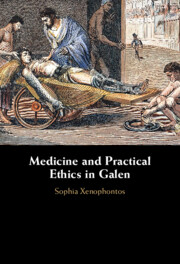In this article, I examine Galen’s credentials as an ethical philosopher on the basis of his recently discovered essay Avoiding Distress (Peri alypias). As compensation for the scholarly neglect from which Galen’s ethics suffers, I argue that his moral agenda is an essential part of his philosophical discourse, one that situates him firmly within the tradition of practical ethics of the Roman period. Galen’s engagement with Stoic psychotherapy and the Platonic-Aristotelian educational model affirms his ethical authority; on the other hand, his distinctive moralising features such as the autobiographical perspective of his narrative and the intimacy between author and addressee render his Avoiding Distress exceptional among other essays, Greek or Latin, treating anxiety. Additionally, I show that Galen’s self-projection as a therapist of the emotions corresponds to his role as a practising physician, especially as regards the construction of authority, the efficacy of his therapy and the importance of personal experience as attested in his medical accounts. Finally, the diligence with which Galen retextures his moral advice in his On the Affections and Errors of the Soul – a work of different nature and intent in relation to Avoiding Distress – is a testimony to the dynamics of his ethics and more widely to his philosophical medicine.
The philosopher’s lecture room is a ‘hospital’: you ought not to walk out of it in a state of pleasure, but in pain; for you are not in good condition when you arrive. Epictetus, Discourses 3.23.30
